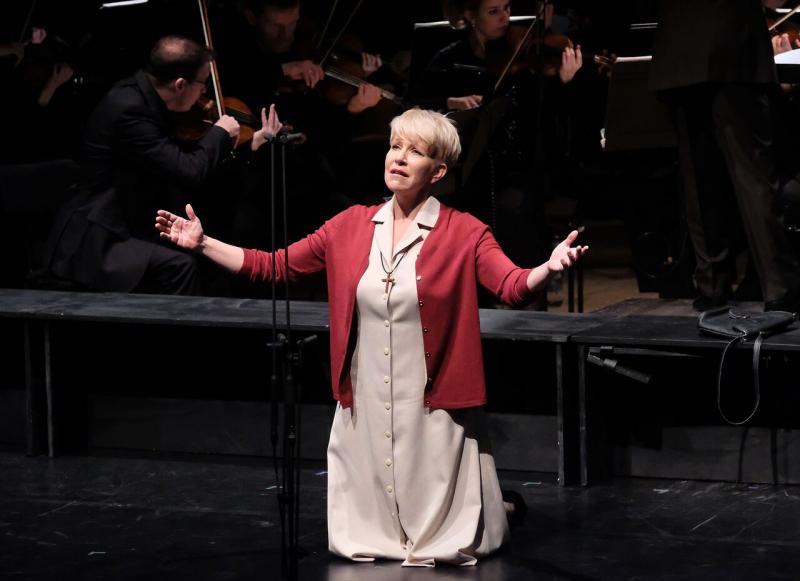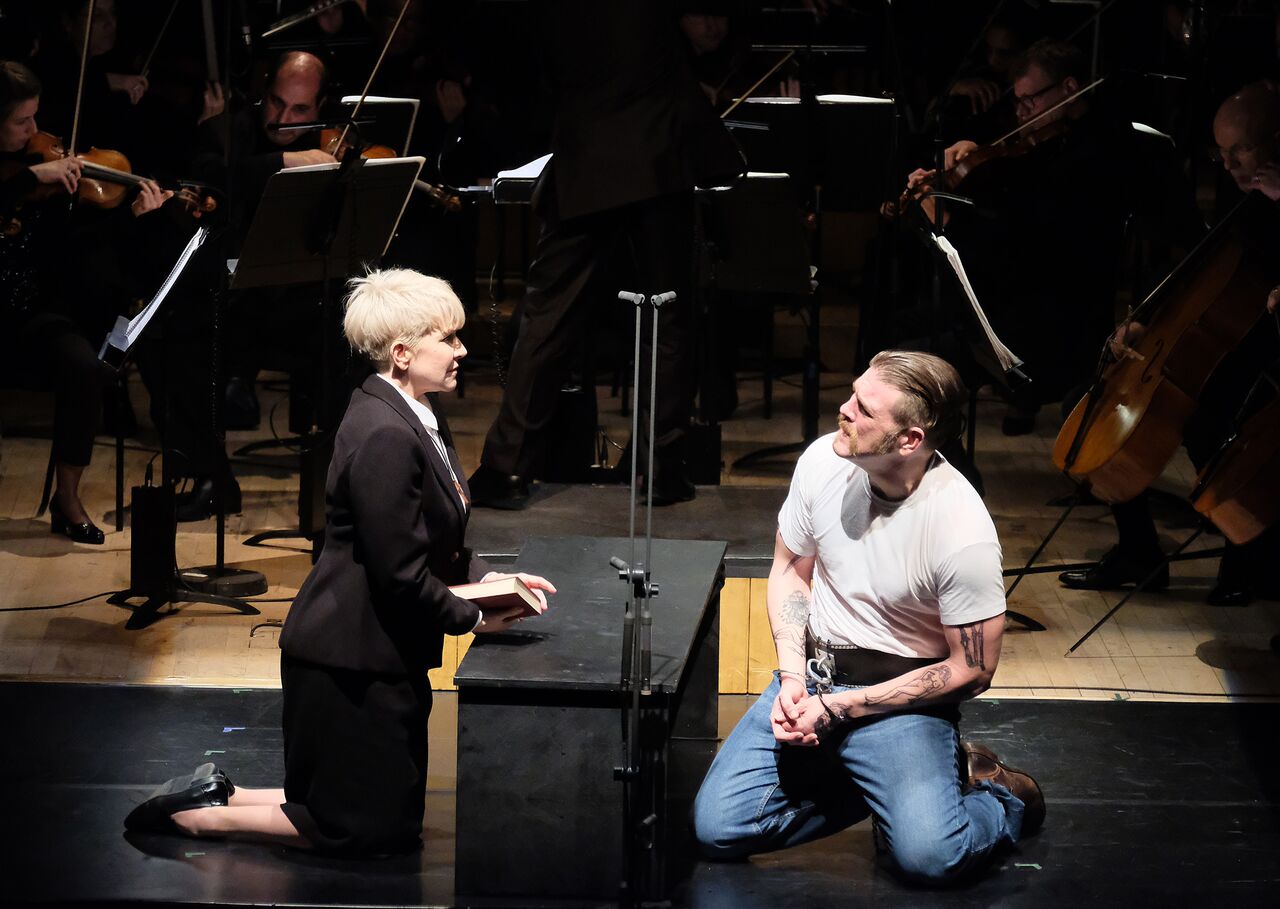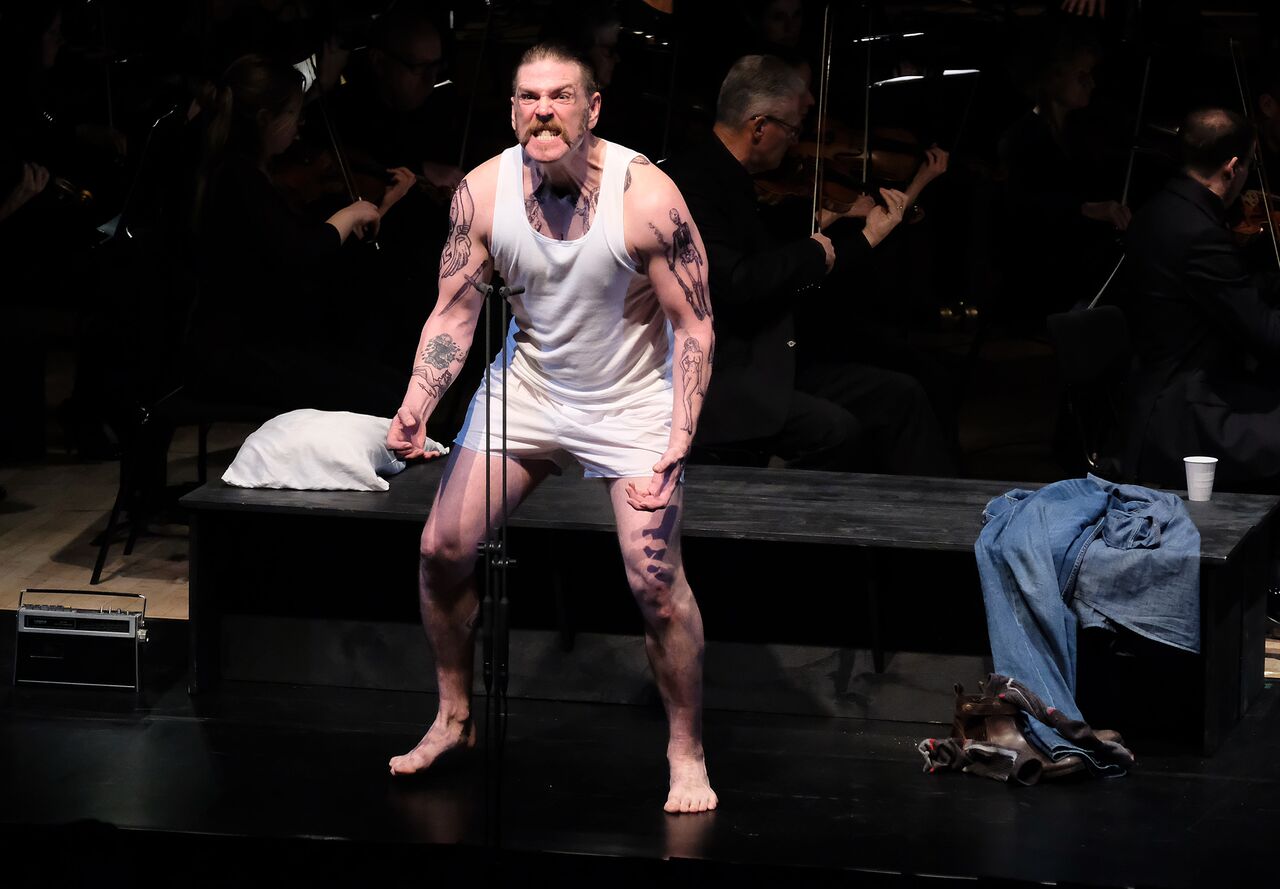Dead Man Walking, Barbican review - timely and devastating meditation on human violence and forgiveness | reviews, news & interviews
Dead Man Walking, Barbican review - timely and devastating meditation on human violence and forgiveness
Dead Man Walking, Barbican review - timely and devastating meditation on human violence and forgiveness
Jake Heggie's outstanding first opera finally receives its UK premiere

You have to wonder why it has taken this long. Jake Heggie’s Dead Man Walking premiered in San Francisco back in 2000 and has since been performed over 300 times across the world, staged everywhere from Cape Town to Copenhagen.
In the time it has taken Dead Man Walking to almost reach us in London, we’ve had two elaborate, fully staged productions of Nico Muhly oratorios masquerading as operas (and at least one by John Adams), several indifferent, profoundly undramatic late operas by Philip Glass, and more minor works mistaking motoric ostinati for dramatic scaffolding than I can count.
So, when presented with a tried-and-tested piece of music-drama with a real-life story made famous by a Hollywood blockbuster, it begs the question of whether snobbery or cynicism has prevented UK opera companies from committing to a run, even without the box-office guarantee that this performance offered in the form of Joyce DiDonato’s Sister Helen Prejean.
 The Louisiana setting of Heggie’s opera – the first, of a fast-growing catalogue by the American composer – gives him the key to unlock this forbidding story of an unrepentant double murderer on death row, his friendship with nun Sister Helen (DiDonato, pictured right with Michael Mayes as convict Joseph de Rocher), and his eventual execution by lethal injection. The spiritual “He will gather us around” becomes the musical thread woven right through a work that sits, without apology or compromise, at the junction of opera and music-theatre. It sets the tone for music whose essentially classical, tonal harmonies warp and bend in a bluesy heat-haze, slipping easily from Barber to Bernstein (in Broadway mode) and still further without ever feeling like pastiche.
The Louisiana setting of Heggie’s opera – the first, of a fast-growing catalogue by the American composer – gives him the key to unlock this forbidding story of an unrepentant double murderer on death row, his friendship with nun Sister Helen (DiDonato, pictured right with Michael Mayes as convict Joseph de Rocher), and his eventual execution by lethal injection. The spiritual “He will gather us around” becomes the musical thread woven right through a work that sits, without apology or compromise, at the junction of opera and music-theatre. It sets the tone for music whose essentially classical, tonal harmonies warp and bend in a bluesy heat-haze, slipping easily from Barber to Bernstein (in Broadway mode) and still further without ever feeling like pastiche.
And that’s the excitement here; what Heggie and librettist Terrence McNally have so brilliantly achieved in Dead Man Walking is to create an unaffected, genuinely contemporary, genuinely dramatic operatic telling of a story that has the scope to take it. Characters speak – actually speak – to one another in language whose vernacular (“Have some respect, she’s a fucking nun”) is the rough, sometimes funny, always familiar communication of everyday, not the odd, affected opera-speak that we regular suspend disbelief over. It’s a language that gives Heggie in turn the space both to swell into great, climactic choruses in the finales of both acts, but also the flexibility and agility to zoom in close for a passing conversation between Sister Helen and a traffic cop.
 Performances honed in Madrid translated beautifully to the simpler staging here, and the new accompaniment of the BBC Symphony Orchestra under a typically incisive Mark Wigglesworth. DiDonato has lived with and grown with this role since 2002, and it shows. Heggie’s grateful vocal writing and McNally’s just-this-side-of-sentimentalism show off the best of this generous stage-creature, and if there is still an odd fluttering and an occasional wildness to the very top of the voice, it’s still an exhilarating performance. We got no less from Michael Mayes’ Joseph de Rocher (pictured above), whose craggy physicality and cringing bravura has all the sharp nooks and rough dramatic fissures of his namesake. Mayes’ baritone, by contrast, is molasses-smooth, and thickly poured through his Act Two aria.
Performances honed in Madrid translated beautifully to the simpler staging here, and the new accompaniment of the BBC Symphony Orchestra under a typically incisive Mark Wigglesworth. DiDonato has lived with and grown with this role since 2002, and it shows. Heggie’s grateful vocal writing and McNally’s just-this-side-of-sentimentalism show off the best of this generous stage-creature, and if there is still an odd fluttering and an occasional wildness to the very top of the voice, it’s still an exhilarating performance. We got no less from Michael Mayes’ Joseph de Rocher (pictured above), whose craggy physicality and cringing bravura has all the sharp nooks and rough dramatic fissures of his namesake. Mayes’ baritone, by contrast, is molasses-smooth, and thickly poured through his Act Two aria.
An all-star supporting cast that included Susan Bickley, James Creswell and Susan Bullock, as well as a radiant performance from Canadian soprano Measha Brueggergosman as Sister Rose and fine contributions from both the BBC Singers and Finchley Children’s Music Group, gave their all, delivering one of the most complete and engrossing performances the Barbican has seen so far this season. As a musical performance it was exemplary, but as a meditation on the human capacity both for horror and forgiveness, for love in the face of senseless brutality, it was – in this of all weeks – a very necessary balm.
- The Barbican's The Art of Change season continues throughout 2018
- Read more opera reviews on theartsdesk
The future of Arts Journalism
You can stop theartsdesk.com closing!
We urgently need financing to survive. Our fundraising drive has thus far raised £49,000 but we need to reach £100,000 or we will be forced to close. Please contribute here: https://gofund.me/c3f6033d
And if you can forward this information to anyone who might assist, we’d be grateful.

Subscribe to theartsdesk.com
Thank you for continuing to read our work on theartsdesk.com. For unlimited access to every article in its entirety, including our archive of more than 15,000 pieces, we're asking for £5 per month or £40 per year. We feel it's a very good deal, and hope you do too.
To take a subscription now simply click here.
And if you're looking for that extra gift for a friend or family member, why not treat them to a theartsdesk.com gift subscription?
more Opera
 Tosca, Welsh National Opera review - a great company reduced to brilliance
The old warhorse made special by the basics
Tosca, Welsh National Opera review - a great company reduced to brilliance
The old warhorse made special by the basics
 BBC Proms: The Marriage of Figaro, Glyndebourne Festival review - merriment and menace
Strong Proms transfer for a robust and affecting show
BBC Proms: The Marriage of Figaro, Glyndebourne Festival review - merriment and menace
Strong Proms transfer for a robust and affecting show
 BBC Proms: Suor Angelica, LSO, Pappano review - earthly passion, heavenly grief
A Sister to remember blesses Puccini's convent tragedy
BBC Proms: Suor Angelica, LSO, Pappano review - earthly passion, heavenly grief
A Sister to remember blesses Puccini's convent tragedy
 Orpheus and Eurydice, Opera Queensland/SCO, Edinburgh International Festival 2025 review - dazzling, but distracting
Eye-popping acrobatics don’t always assist in Gluck’s quest for operatic truth
Orpheus and Eurydice, Opera Queensland/SCO, Edinburgh International Festival 2025 review - dazzling, but distracting
Eye-popping acrobatics don’t always assist in Gluck’s quest for operatic truth
 MARS, Irish National Opera review - silly space oddity with fun stretches
Cast, orchestra and production give Jennifer Walshe’s bold collage their all
MARS, Irish National Opera review - silly space oddity with fun stretches
Cast, orchestra and production give Jennifer Walshe’s bold collage their all
 Káťa Kabanová, Glyndebourne review - emotional concentration in a salle modulable
Janáček superbly done through or in spite of the symbolism
Káťa Kabanová, Glyndebourne review - emotional concentration in a salle modulable
Janáček superbly done through or in spite of the symbolism
 Buxton International Festival 2025 review - a lavish offering of smaller-scale work
Allison Cook stands out in a fascinating integrated double bill of Bernstein and Poulenc
Buxton International Festival 2025 review - a lavish offering of smaller-scale work
Allison Cook stands out in a fascinating integrated double bill of Bernstein and Poulenc
 Tosca, Clonter Opera review - beauty and integrity in miniature
Happy surprises and a convincing interpretation of Puccini for today
Tosca, Clonter Opera review - beauty and integrity in miniature
Happy surprises and a convincing interpretation of Puccini for today
 Hamlet, Buxton International Festival review - how to re-imagine re-imagined Shakespeare
Music comes first in very 19th century, very Romantic, very French operatic creation
Hamlet, Buxton International Festival review - how to re-imagine re-imagined Shakespeare
Music comes first in very 19th century, very Romantic, very French operatic creation
 Falstaff, Glyndebourne review - knockabout and nostalgia in postwar Windsor
A fat knight to remember, and snappy stagecraft, overcome some tedious waits
Falstaff, Glyndebourne review - knockabout and nostalgia in postwar Windsor
A fat knight to remember, and snappy stagecraft, overcome some tedious waits
 Salome, LSO, Pappano, Barbican review - a partnership in a million
Asmik Grigorian is vocal perfection in league with a great conductor and orchestra
Salome, LSO, Pappano, Barbican review - a partnership in a million
Asmik Grigorian is vocal perfection in league with a great conductor and orchestra
 Semele, Royal Opera review - unholy smoke
Style comes and goes in a justifiably dark treatment of Handelian myth
Semele, Royal Opera review - unholy smoke
Style comes and goes in a justifiably dark treatment of Handelian myth

Add comment